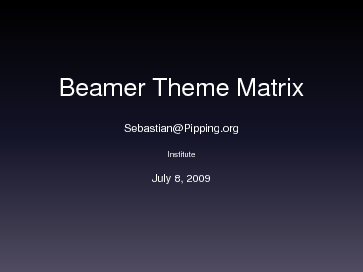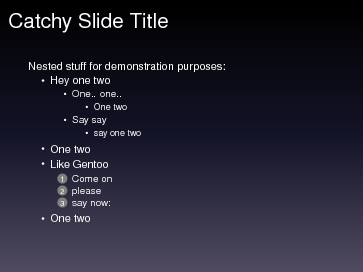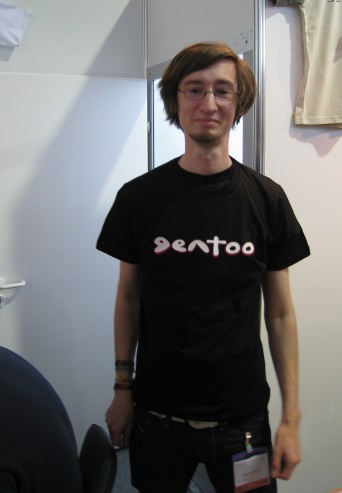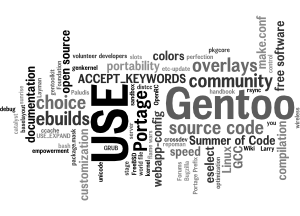Git User Survey 2009
From July 15 to September 15 the
is open for participation. It's fun and you might shape Git's future a bit. Please have a look.
Manhattan: a Keynote look-alike LaTeX Beamer theme
Today, pictures first:


Inspired by Shawn Lankton's keynote-lankton beamer theme I have created a LaTeX Beamer theme Manhattan: my attempt at bringing a bit more Keynote spirit to Free Software land. Please give it a try, usage is as easy as
\usetheme{Manhattan}
Downloads:
The current license is a dual-license on
- Creative Commons Attribution-Noncommercial-ShareAlike 3.0 License
- GNU General Public License 3.0 or later
PS: have a look here if you wonder what Beamer Theme Matrix is about.
"Privacy on the Web" survey
Today I finally participated in this interesting online survey about privacy on the internet:
Maybe you'll find it interesting, too.
A friend of yours is still using Internet Explorer?
Really? That's shocking! Unless that person is an "I love my Vista" (met one before, no joke) there might be no better time than now to show the "Meet Firefox" video (bottom of the page linked) introducing Mozilla Firefox 3.5 to him/her. Direct downloads would be:
Gentoo t-shirts: the black one
For LinuxTag 2009 we had three t-shirts for sale:
- White
- Black
- Larry
Robert's blog post shows Larry and White. Here's a front shot of the black one to complete the collection:

Gentoo word cloud poster
Robert (rbu@gentoo) and I have started playing with
wordle.net yesterday and created this Gentoo word
cloud with it:
 Here's the SVG source file (licensed under CC-BY-SA 3.0). We made a 120x70 cm² poster
from that for LinuxTag, cutting and glueing pieces together ourselves today.
Please excuse the image quality. 3D excerpt view:
Here's the SVG source file (licensed under CC-BY-SA 3.0). We made a 120x70 cm² poster
from that for LinuxTag, cutting and glueing pieces together ourselves today.
Please excuse the image quality. 3D excerpt view:
Full view, on table:
Gentoo wordle and Robert/rbu:

I'll try to provide some kind of "sources" (for reproduction of variations at least) next: Worldle text input
ACCEPTLKEYWORDS ACCEPTLKEYWORDS ccache choice choice choice community community community compilation compilation control customization customization debug distcc documentation documentation ebuilds ebuilds ebuilds empowerment eselect eselect flame~wars FreeBSD GCC GCC Gentoo Gentoo Gentoo Gentoo Gentoo Gentoo Gentoo Larry Layman Linux Linux make.conf make.conf OpenRC optimization overlays overlays overlays package.mask Paludis perfection pkgcore portability portability Portage Portage Portage Portage~Prefix slots source~code source~code source~code speed speed USE USE USE USE USE USE USE USE volunteer~developers webapp-config webapp-config world~file Forums Wiki Summer~of~Code Summer~of~Code Bugzilla repoman USELEXPAND you kernel wireless stage server bash unicode rsync GRUB Foundation sunrise free~software free~software open~source open~source handbook catalyst gentoolkit colors colors baselayout sandbox genkernel etc-update crossdev
Note, that we produces underscores from big "L"s and cutting them down with Inkscape. No, really. Further wordle settings were:
- Font = Meloche RG Bold
- Layout = Straight Edges + Mostly Horizontal
- Color = Ghostly + A little variance
With a small "patch" for net-print/poster we made it produce pages that overlapped strongly:
--- poster-20050907/poster.c +++ poster-20050907/poster.c @@ -949,7 +949,7 @@ "/posteryb %d def\n" "/do_turn %s def\n" "/strg 10 string def\n" - "/clipmargin 6 def\n" + "/clipmargin 150 def\n" "/labelsize 9 def\n" "/tiledict 250 dict def\n" "tiledict begin\n"
For normal posters that's no use but for our case with words scattered on a white background it allowed flexible cutting of pages so we had to hurt no letters, in hope to produce a higher quality result. Come by at the booth to see it with your own eyes :-)
oswatershed.org: One more case for PackageMap
At Open Source Watershed Scott Shawcroft is comparing 9 major GNU/Linux distributions for "package freshness" in several dimensions. He compares how software flows down from upstream (say the kernel team) to downstream (say Gentoo) across distributions. To do so there is package mapping in place. Surprise! :-) His current approach maps certain package names onto others and the rest to itself:
- foo3-dev -> foo3
- foo3-doc -> foo3
- foo3 -> NULL -> foo3
Like packagemap it also involves manual editing. We're at discussing collaboration details. Stay tuned.
1000+ Gentoo packages in PackageMap
I count 1011 Gentoo packages in the packagemap repository now. I'm serious about packagemap. Through an extra script it got a little bit easier today for you to join in: To add an entry for package "dev-libs/icu" to the map you
- do a quick research about the package's vendor (and find "ibm")
- decide for a product name ("libicu" here, "lib" prefix for all libraries)
- run a script :
cd code/gentoo ./map-package-to-vendor.sh dev-libs/icu ibm libicu
That script creates a packagemap file database/ibm/libicu.xml for you,
that's it. The third parameter (the product name) is optional: The package
name ("icu" here) would have been chosen without it. Please consider adding
your own Gentoo packages to packagemap yourself this way. I just cannot do it
all alone. Thank you!
Inviting you to project "PackageMap"
Quick (re-)introduction: My task for Gentoo/Google Summer of Code 2009 is to give Gentoo a Debian popcon equivalent, a tool to collect statistics on "what package is installed how often". To achieve this goal I'm extending Smolt (a tool currently doing similar things with hardware information) by fine-tunable software stats gathering. The plan we have for Smolt is to make it cross-distro, not just fit Gentoo or Fedora. One point where the consequences and benefits of such an approach can be seen clearly is with counting packages from different distros into the same buckets.
What do I mean by that? Debian's Git counts for Gentoo's Git counts for Fedora's, you know the list. With packages counted from accross distros we can suddenly answer questions that we currently cannot answer, among them
-
What globally popular packages are missing in distro X? Let's say we don't have a package for product P. Do other distros have one? They do, maybe we need one, too? They don't, maybe P is not that important then?
-
How many Linux users are approximately using program X in total? Not just on Ubuntu or Arch - all across Linux, BSD, Solaris!
-
Does distro X have 10 times the packages of Y or is it just different splitting?
To count into the same bucket we use global identifiers for the "products" that fall out of a package. Gentoo package "dev-util/git" can produce product "cpe://a:git:git", Debian's "git-core" can, too. That string before is a CPE name, a concept close to package naming in Java. This "intermediate language" allows us to relate package names from distro X with those of distro Y and answer various questions from that data. To do such mapping we need code (or a "service") that does the mapping for us and base of collected data that the service can operate on. Both of these is project "PackageMap". I have started populating the database with packages (currently 312 in number) made from information extracted from the Gentoo tree and the National Vulnerability Database. Latter holds many CPEs. Let me state clearly that packagemap is not about Gentoo in particular. Sure, the initial data has lots of Gentoo in it but the whole point of the project is to get information and people from different distros together. To see what these 312 packages maps look like at the moment you best do a few clicks through the database folder yourself: https://git.goodpoint.de/?p=packagemap.git;a=tree;f=database Also, there are Relax NG schema and DTD for validation, more documentation than I usually write and a few scripts: https://git.goodpoint.de/?p=packagemap.git;a=tree
By now I hope you have gained interest in what this can become. Your active participation is highly appreciated. A few minutes from everyone can make a huge difference here. If you want write access to the repo - mail me: sebastian@pipping.org. Please have a look at the Git repository and ask questions. Thanks for reading up to this point. PS: I'm aware "hartwork.org" might not make a good longterm location for DTDs, XML namespaces and such for a cross-distro project. Any ideas where to put them best?
Gentoo, GSoC, Smolt, PackageMap
One more about GSoC porgress. This won't be complete or so, just a few more bytes.
- I'm in close contact with my mentor (rbu) and Smolt upstream.
- A few tiny patches have been accepted by latter already.
- I have a smolt server (called "smoon") running on my local machine that I can submit to.
- The Daft Punk live disc "Alive" (2007) rocks, again and again. Okay, not too on-topic.
- I have started working on fine configuration of "what you submit" and will continue working on that once sub project "packagemap" reaches a point where it moves without me.
- Project "packagemap" needs an extra post as well as a few mails including one to gentoo-dev. Stay tuned.

